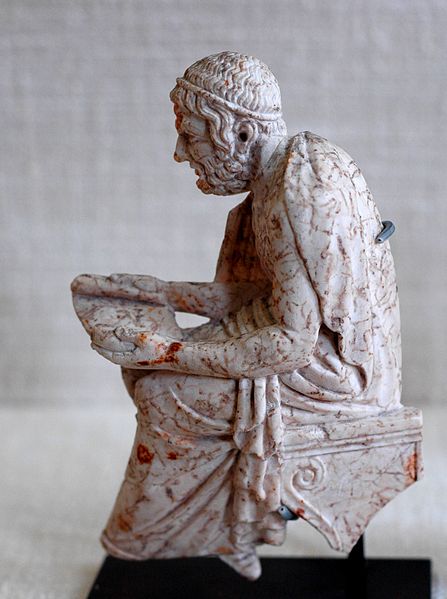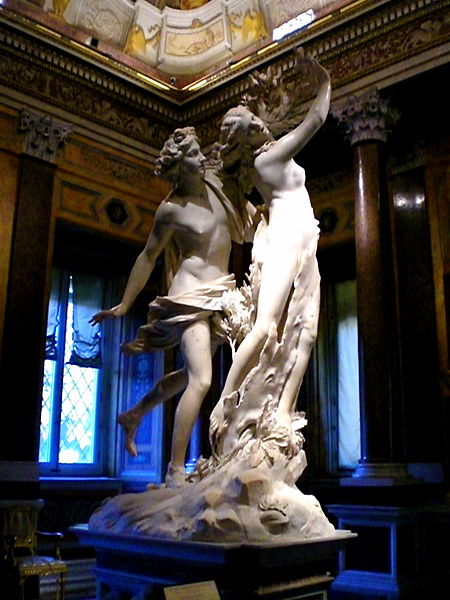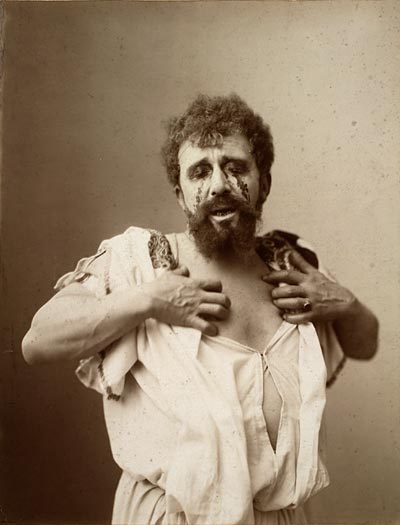 Print book
Print book
READ: Sophocles and Oedipus Rex
Read this book about Sophocles and Oedipus Rex to complete the requirements for the week.
| Site: | Mountain Heights Academy OpenCourseWare |
| Course: | Theater Q1 v2013 |
| Book: | READ: Sophocles and Oedipus Rex |
| Printed by: | Guest user |
| Date: | Saturday, 28 April 2018, 1:26 PM |
1 Who is Sophocles?
Sophocles, another Greek playwright, was younger than Aeschylus by a generation. He was also greatly involved in the political, cultural and religious life of Athens. He first led a Chorus at the age of 16. In addition, he held the office of Treasurer, was a General, was on the Board of Governors of Athens, and was also a Priest.Sophocles wrote 123 plays during the course of his life, but only seven have survived in a complete form: Ajax, Antigone, Trachinian Women, Oedipus the King, Electra, Philoctetes and Oedipus at Colonus, though Oedipus the King is arguably his most famous.

Sophocles is credited with influencing the development of drama by adding a third actor, and reducing the importance of the Chorus in the presentation of the plot. For Sophocles, the Chorus does not advance the plot, but instead takes the role of a minor character. He also developed his characters to a greater extent than did Aeschylus.
Source:
Brockett, O.G. (1999) History of the Theatre, (8th ed). MA: Allyn & Bacon.
2 Oedipus the King
Oedipus the King, is often referred to as Oedipus Rex. This is arguably the most famous play written by Sophocles. If you read only one Greek tragedy, this would more than likely be it. In terms of importance, it has been called equivalent to Hamlet.
The basic plot of Oedipus is this: a terrible plague has descended on the city of Thebes, the citizens turn to King Oedipus to help them. King Oedipus is a much revered King. He had saved the city once before from disaster by solving the riddle of the Sphinx. In return for this service, he was awarded the throne, as well as the hand of the widowed Queen, Jocasta.
Creon' who is Jocasta's brother, gets the oracle of Apollo, which states that the city of Thebes can be saved from the terrible plague on one condition. The murderer of Laius, Jocasta's dead husband, and former King, must be found and punished. Creon tells King Oedipus that Laius was killed by a bandit on his way to the city of Delphi, as was reported by the only eyewitness to the crime. Oedipus thinks that the bandit was hired by Theban conspirators and asks the seer, Tiresias for more information. Tiresias knows who really killed Laius, and avoids Oedipus' questions, so Oedipus thinks that Tiresias is in collusion with the murderer. Oedipus accuses Tiresias of protecting the murderer.
Tiresias, angry at being accused, tells Oedipus that he himself is the murderer. But Oedipus doesn't listen to him, he even accuses Creon of being involved. At this point, Jocasta defends her brother. Oedipus tells Jocasta that Tiresias has accused him of the murder, and Jocasta says that it can't be true. There was a former prophesy or oracle, which said that Laius would be killed, "where three roads meet" by his and Jocasta's son.
Laius made sure that this oracle would never come true by having his only newborn son thrown out on a mountain and left to die, so Jocasta says that you can't believe in oracles.
However, Oedipus gets unnerved at the mention of "three roads meet." He questions Jocasta severely about the EXACT location, the time of the murder, and the appearance of Laius. He finally realizes that indeed, it was he, Oedipus, that WAS the murderer.
Then he explains that he himself has sought Apollos oracle, since he was accused of not knowing his parentage, and the oracle stated that he was "destined to kill his father, and have children by his mother." However, there is one eyewitness to the murder that Oedipus thinks he has committed, if he can find him, than he can find out if he is really guilty.
Jocasta says once again, that you can't believe in oracles. HUGE oops - it's really not a good idea to deny Apollo.
Source:
Sophocles, Oedipus the King, (429 B.C.).
Creon' who is Jocasta's brother, gets the oracle of Apollo, which states that the city of Thebes can be saved from the terrible plague on one condition. The murderer of Laius, Jocasta's dead husband, and former King, must be found and punished. Creon tells King Oedipus that Laius was killed by a bandit on his way to the city of Delphi, as was reported by the only eyewitness to the crime. Oedipus thinks that the bandit was hired by Theban conspirators and asks the seer, Tiresias for more information. Tiresias knows who really killed Laius, and avoids Oedipus' questions, so Oedipus thinks that Tiresias is in collusion with the murderer. Oedipus accuses Tiresias of protecting the murderer.
Tiresias, angry at being accused, tells Oedipus that he himself is the murderer. But Oedipus doesn't listen to him, he even accuses Creon of being involved. At this point, Jocasta defends her brother. Oedipus tells Jocasta that Tiresias has accused him of the murder, and Jocasta says that it can't be true. There was a former prophesy or oracle, which said that Laius would be killed, "where three roads meet" by his and Jocasta's son.
Laius made sure that this oracle would never come true by having his only newborn son thrown out on a mountain and left to die, so Jocasta says that you can't believe in oracles.
However, Oedipus gets unnerved at the mention of "three roads meet." He questions Jocasta severely about the EXACT location, the time of the murder, and the appearance of Laius. He finally realizes that indeed, it was he, Oedipus, that WAS the murderer.
Then he explains that he himself has sought Apollos oracle, since he was accused of not knowing his parentage, and the oracle stated that he was "destined to kill his father, and have children by his mother." However, there is one eyewitness to the murder that Oedipus thinks he has committed, if he can find him, than he can find out if he is really guilty.
Jocasta says once again, that you can't believe in oracles. HUGE oops - it's really not a good idea to deny Apollo.
Source:
Sophocles, Oedipus the King, (429 B.C.).
3 Oedipus Continued
When we last visited Oedipus, he was determined to find the eyewitness to the murder and ascertain whether or not he actually committed the crime. Jocasta, his wife, tells him it is foolish to believe in oracles, which angers the god Apollo.
*Depiction of the God Apollo*
Oedipus is trying to find the truth, and at the same time, hide it from Jocasta. At this point, on old man and the eyewitness both arrive at the palace. Trying to put Oedipus' mind at rest, the old man tells him that Polybus, his supposed father, has died, and that Oedipus is not his real son. He tells Oedipus that he was found by a Theban herdsman as an infant. Jocasta, eavesdrops on the conversation, and at this point tries to prevent Oedipus from investigating any further, but he is determined.
He questions the eyewitness at this point, and he reluctantly tells him about the murder. Oedipus is horrified to discover that he did in fact commit the murder. The consequences of this discovery are dramatized for great effect.
A servant appears to relate that Jocasta has hanged herself, and Oedipus has gouged out his eyes.

He questions the eyewitness at this point, and he reluctantly tells him about the murder. Oedipus is horrified to discover that he did in fact commit the murder. The consequences of this discovery are dramatized for great effect.
A servant appears to relate that Jocasta has hanged herself, and Oedipus has gouged out his eyes.

Generally in Greek tragedy, it is clear that men deserve their fate, or consequences, due to some type of HUBRIS, however, it is difficult to see why Oedipus is punished, he did nothing intentional to deserve his fate. It can only be concluded that Apollo has made he and Jocasta suffer. The gods are too distant and too powerful to be understood by mere mortals, so it is not surprising that it is difficult to find meaning in the suffering.
HOPE is the fatal element of the play: hope of the citizens for the end of the plague, hope of Laius to prevent his own murder, and hope that Oedipus could avoid the oracle's prophecy. The tragedy of Oedipus, is that he goes to ruin down the very path he took to escape it.
Source:
Sophocles, Oedipus the King, (429 B.C.).
HOPE is the fatal element of the play: hope of the citizens for the end of the plague, hope of Laius to prevent his own murder, and hope that Oedipus could avoid the oracle's prophecy. The tragedy of Oedipus, is that he goes to ruin down the very path he took to escape it.
Source:
Sophocles, Oedipus the King, (429 B.C.).
4 Imagery of Oedipus
Throughout the play, Oedipus the King, the imagery that is apparent is that of sight and blindness, light and darkness.Most people think, after reading this play that Fate must be irrevocably pre-determined, fore-ordained and laid down by the gods. Free will is an illusion. The more that man tries to lay out a path for himself different than that fixed by Destiny, the more he is sure to follow that path.
BUT THIS IS A MISREADING, AND A MISUNDERSTANDING OF GREEK CHARACTER AND WILL.

Oedipus does follow a predetermined path, but he does this because his nature wills it. He fled his foster parents, without first making an inquiry into his birth; he felt intellectually challenged enough to demonstrate his intelligence by solving the riddle of thee Sphinx; he chose to marry a woman old enough to be his mother.
He allows his passions and quick temper to rule his better instincts; he denounces the Priest, or seer, as a traitor; he accuses brother-in-law of treachery; and he fiercely and doggedly pursues the truth at his own cost, and that of the people nearest and dearest to him.
Oedipus displays impiety towards the gods, hot anger towards the well intentioned and intellectual inquiry beyond the bounds of reason. For these reasons, he could be seen to commit HUBRIS. At the very least he demonstrates a significant lack of common sense or well-rounded wisdom.
Fate is only a term that is used to describe the way that life turns out for men, not to describe how it was predetermined from the start. All of us have the ability and the freedom to disregard such a notion and follow our own desires and suffer the consequences of these actions.
Think about this....can there be any real human suffering without free will?
Source:
Sophocles, Oedipus the King, (429 B.C.).
He allows his passions and quick temper to rule his better instincts; he denounces the Priest, or seer, as a traitor; he accuses brother-in-law of treachery; and he fiercely and doggedly pursues the truth at his own cost, and that of the people nearest and dearest to him.
Oedipus displays impiety towards the gods, hot anger towards the well intentioned and intellectual inquiry beyond the bounds of reason. For these reasons, he could be seen to commit HUBRIS. At the very least he demonstrates a significant lack of common sense or well-rounded wisdom.
Fate is only a term that is used to describe the way that life turns out for men, not to describe how it was predetermined from the start. All of us have the ability and the freedom to disregard such a notion and follow our own desires and suffer the consequences of these actions.
Think about this....can there be any real human suffering without free will?
Source:
Sophocles, Oedipus the King, (429 B.C.).
5 Dramatic Irony
There is a great deal of dramatic irony present in the play Oedipus the King.For example:
1) Oedipus is the blindest when he calls Tiresias, the seer blind.
2) Oedipus is cursing himself when he thinks he is cursing the slayer of Laius.
3) Oedipus can answer the impossible Sphinx-riddle, but he has no answer to the riddle of his own existence.
2) Oedipus is cursing himself when he thinks he is cursing the slayer of Laius.
3) Oedipus can answer the impossible Sphinx-riddle, but he has no answer to the riddle of his own existence.

*Oedipus and the Sphinx*
4) Every attempt he makes to help his subjects of Thebes only serves to bring more harm to himself.
5) Every attempt he makes to avert danger, only serve to bring it nearer.
Many of you have of "The Oedipus Complex." This is a term coined by Sigmund Freud.

Freud was a psychoanalyst who redefined sexual desire as the primary motivating force of human life. He stated that the "Oedipus Complex", was the instinct that male children have to love their mothers, and want to do away with their fathers. Many people disagree with Freud's theories, but do acknowledge that children during their developmental stages go through periods of "competition" with the same sex parent for the affection of the parent of the opposite sex.
It is ironic that Freud has termed this the "Oedipus Complex", because in the tale of Oedipus the King, he falls in love with his mother by accident. He does not set out to create this situation.
There are several Main Themes that we can identify in Oedipus the King.
Source:
Sophocles, Oedipus the King, (429 B.C.).
Brockett, O.G. (1999) History of the Theatre, MA: Allyn & Bacon.
It is ironic that Freud has termed this the "Oedipus Complex", because in the tale of Oedipus the King, he falls in love with his mother by accident. He does not set out to create this situation.
There are several Main Themes that we can identify in Oedipus the King.
1) Suffering brings about knowledge and awareness.
2) Man is individually and solely responsible for his own behavior.
3) To set human reason above strict obedience to the gods is an act of HUBRIS
4) Fate for man contains within it a complex set of ironies.
5) There are tragic and fateful consequences for men who display excessive HUBRIS, (pride) which will lead to retribution at the hands of the gods.
2) Man is individually and solely responsible for his own behavior.
3) To set human reason above strict obedience to the gods is an act of HUBRIS
4) Fate for man contains within it a complex set of ironies.
5) There are tragic and fateful consequences for men who display excessive HUBRIS, (pride) which will lead to retribution at the hands of the gods.
Source:
Sophocles, Oedipus the King, (429 B.C.).
Brockett, O.G. (1999) History of the Theatre, MA: Allyn & Bacon.